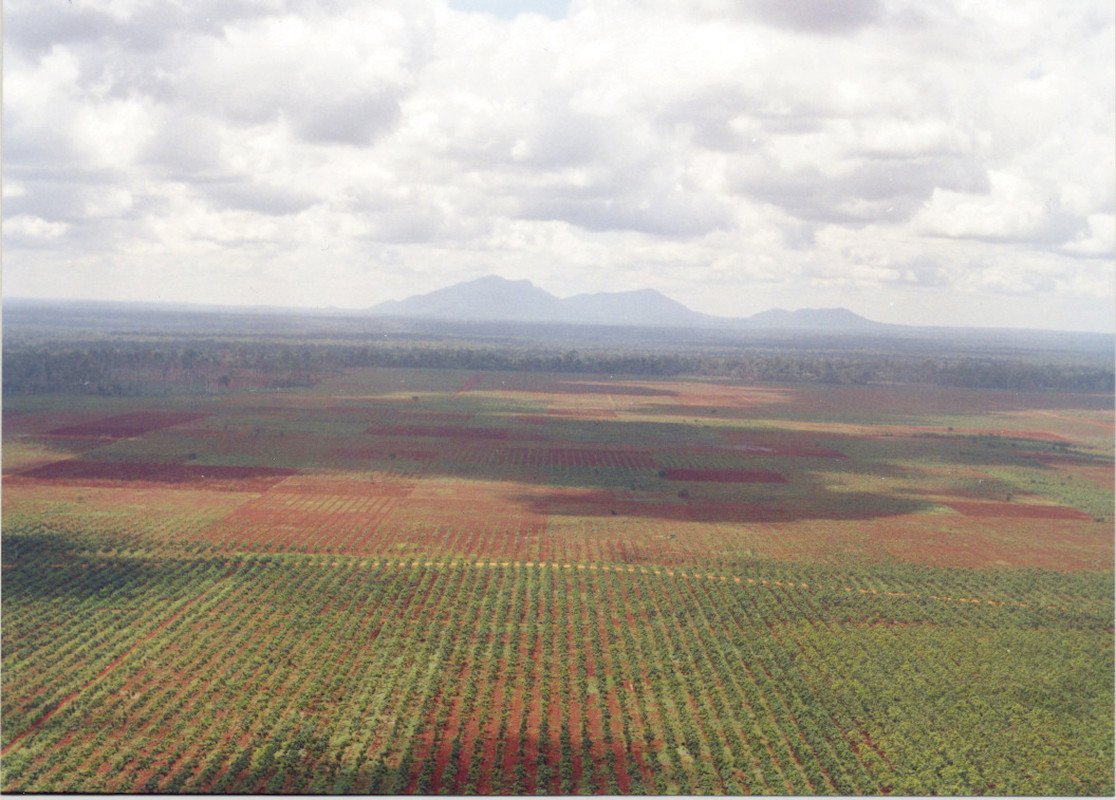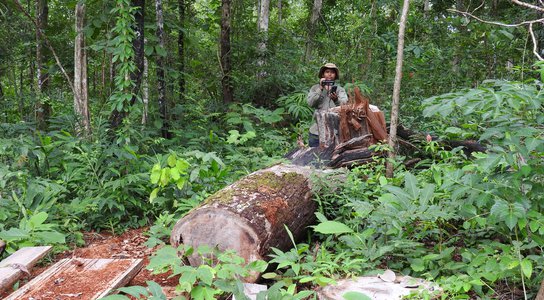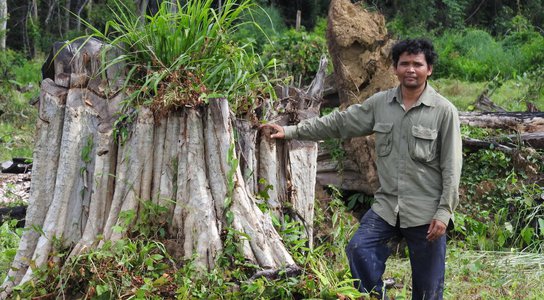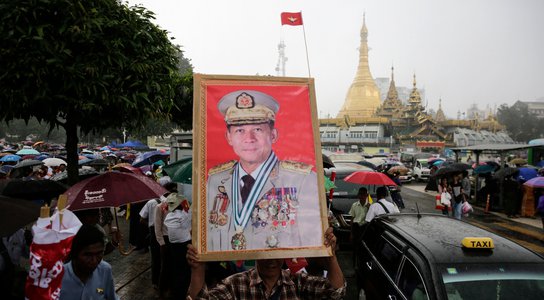
Tumring Rubber Plantation, Prey Lang Forest. Chris Kelly / Global Witness
In 1995, on Global Witness’s first-ever investigation, I stood looking at the 11th-century Khmer temple at Preah Vihear, perched on top of the steep jungle-clad escarpment which marked the border, where Thailand’s Dângrêk Mountain range plunged 800 metres down into the Cambodian plain.
Dominating the territory to the south, east and west, the temple and its Khmer Rouge occupants looked out across a seemingly endless sea of rainforest that filled the horizon under a vast azure sky. It was absolutely breathtaking.
We were there to investigate the Khmer Rouge’s trade in timber with Thailand, which was filling the rebels’ war-chest to the tune of US$10-20 million per month. It’s almost unbelievable to me that in the intervening 25 years, that rainforest has almost entirely disappeared. But whilst the Khmer Rouge inflicted some damage to the forests, it was the subsequent (and current) dictatorship that sealed their fate.
In their years of power the world looked on in horror as the Khmer Rouge killed between 1.2-2.8 million people, up to 30% of Cambodia’s population in the biggest genocide since the Nazi Holocaust, immortalised in the Hollywood film The Killing Fields. Sadly, the peace that followed the 1991 Paris Peace Accords and the United Nations’ peacekeeping intervention, gave way to a violent autocratic kleptocracy that exists to this day.
Timber Barons
Violent, criminal and politically well-connected timber barons close to Cambodia’s extraordinarily corrupt government paid for licenses to log the forests; they were followed by other cronies who set up ‘economic land concessions’ to plant commodities like rubber. By 2015, NASA reported that Cambodia had one of the fastest deforestation rates on the planet - between 2001-2019, Cambodia lost over 2 million hectares.
Global Witness and others documented the Cambodian government’s land grabbing frenzy and human rights abuses for over two decades. Hundreds of thousands of poor Cambodians have been illegally and violently displaced from their land. Half the 190,000 minority indigenous people had lost their ancestral land and, with it, their way of life. Those who resist have been beaten, murdered, or arrested on trumped-up charges. Entire villages have been burnt to the ground. The Cambodian genocide was undoubtedly a crime against humanity, and so is this.
Complaint filed with the ICC
In 2014 Global Diligence, led by international criminal lawyer Richard J Rogers, used data gathered by Global Witness to file a complaint to the International Criminal Court (ICC) that has the potential to make history: that crimes associated with mass land grabbing can amount to crimes against humanity under the Rome Statute.
The complaint hit home. In 2016 the ICC Prosecutor issued a policy on case selection - for the first time in history, an international criminal court would prioritise crimes within its jurisdiction that are committed by means of or result in “the destruction of the environment, the illegal exploitation of natural resources, or the illegal dispossession of land.” The Cambodian case fitted perfectly.
Many believed that this policy was a recognition by the ICC Prosecutor that she too understood how the escalating climate crisis and the insatiable scramble for natural resources were resulting in mass human rights abuses. And how putting the brakes on illegal land grabbing would help protect the environment and combat climate change.
But the Cambodia complaint continues to languish in the ICC’s case file in a sort of cryogenic sleep: the Court has not taken action to prosecute this or any other case, that chimes with the new policy to tackle environmental destruction. This has to change.
A sign of change?
Perhaps there’s a glimmer of hope. The ICC’s outgoing Chief Prosecutor, Fatou Bensouda, said in a recent speech that there would soon be news on the Cambodia case, amongst others. As the world comes to terms with the ecological crisis, Bensouda has a last opportunity to show that the ICC Prosecution is awake to the greatest threat facing humanity and understands that the ICC has a role to play.
On 16 March 2021 FIDH, Climate Counsel and Global Witness, plus a host of influential signatories, issued an open letter calling on Fatou Bensouda to open an investigation into the Cambodia case. An ICC investigation into mass crimes associated with environmental destruction would send out an incredibly strong and important message to would-be violators the world over.
This could be the most valuable legacy that Fatou Bensouda could leave behind, but it’s far more than her legacy that’s at stake.


